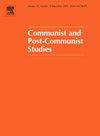专制、霸权、男性主义与抗议的性别化修辞
IF 1.3
4区 社会学
Q3 INTERNATIONAL RELATIONS
引用次数: 1
摘要
本文使用性别视角比较2020年白俄罗斯抗议活动与阿拉伯之春及其在埃及的余波(2011 - 2013)。它认为,在这两种情况下,威权主义军事化的霸权男子气概,通过威权主义的身体政治表达出来,试图压制抗议运动。反过来,后者又利用一些性别化的图像和符号来执行其反霸权的抵抗实践。该研究采用了话语分析和视觉分析方法,并从埃及和白俄罗斯的在线报纸和社交媒体中广泛选择了各自时期的数据。文章的结论是,尽管两国在历史和文化上存在差异,但两国政权和抗议运动在性别政治化和表现方式上有显著的相似之处。这些发现表明,威权主义与军事化的男性霸权之间有着密切的联系,这种联系可以跨地区和跨文化地建立起来。本文章由计算机程序翻译,如有差异,请以英文原文为准。
Authoritarian Hegemonic Masculinities and Gendered Rhetorics of the Protest
This article uses the gender perspective to compare the 2020 Belarus protests and the Arab Spring and its aftermath in Egypt (2011–13). It argues that in both cases authoritarian militarized hegemonic masculinities, articulated through authoritarian body politics, attempted to suppress the protest movements. The latter, in turn, drew on a number of gendered images and symbols to perform its counter-hegemonic practices of resistance. The study employs discourse analysis and visual analysis methods and draws on a broad selection of data from Egyptian and Belarusian online newspapers and social media for the respective periods. The article concludes that, despite historical and cultural differences between the two countries, there are notable similarities in the ways gender is politicized and performed by both the regimes and the protest movements. These findings suggest a close connection between authoritarianism and militarized hegemonic masculinities, which can be established cross-regionally and cross-culturally.
求助全文
通过发布文献求助,成功后即可免费获取论文全文。
去求助
来源期刊

Communist and Post-Communist Studies
Multiple-
CiteScore
1.90
自引率
0.00%
发文量
23
期刊介绍:
Communist and Post-Communist Studies is an international journal covering all communist and post-communist states and communist movements, including both their domestic policies and their international relations. It is focused on the analysis of historical as well as current developments in the communist and post-communist world, including ideology, economy and society. It also aims to provide comparative foci on a given subject by inviting comments of a comparative character from scholars specializing in the same subject matter but in different countries.
 求助内容:
求助内容: 应助结果提醒方式:
应助结果提醒方式:


